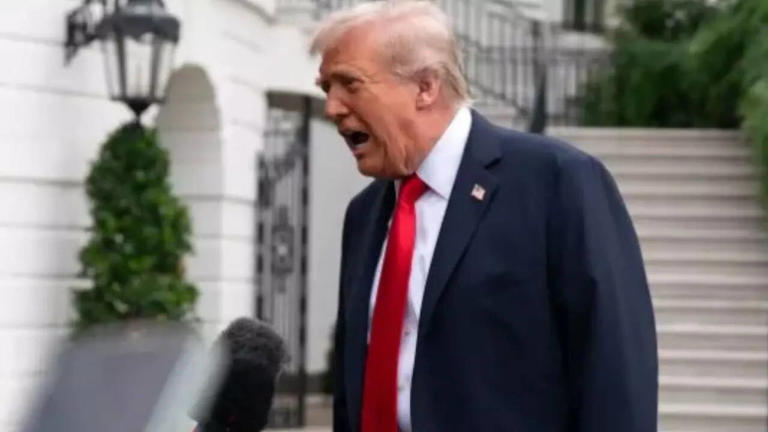US President Donald Trump faced a surprising moment outside the White House on Sunday. An NBC News reporter asked if he planned to “go to war with Chicago.” The question followed a recent post by Trump featuring a meme. The meme suggested the city would soon hear about the newly renamed “Department of War.”
Trump appeared puzzled by the question. He responded sharply, saying, “Darling, that’s common sense.” His brief reply left reporters and bystanders unsure if he was joking or serious.
The exchange occurred just as Trump was leaving the White House grounds. Cameras captured the tense moment, highlighting the unusual tone of the interaction. Journalists pressed for more details, but Trump walked away without further comment.
The meme in question circulated widely on social media. It implied a military-style response toward Chicago, a city often in the spotlight for crime rates and political debates. Critics quickly criticized the post, saying it was inflammatory. Supporters, however, saw it as another example of Trump’s blunt communication style.
Analysts noted that the timing of the meme was unusual. It came amid ongoing discussions about urban crime and federal intervention in cities with high violence rates. Some political commentators suggested that Trump’s response to the reporter was meant to downplay the seriousness of the post. Others argued it reflected his unconventional approach to communication.
Chicago has not officially responded to the meme. Local officials generally try to avoid engaging with national political statements that can escalate tensions. Instead, city leaders focus on ongoing initiatives to improve safety and community programs.
This is not the first time Trump’s comments have sparked confusion. Throughout his presidency, he often made statements on social media or in public appearances that blurred the line between humor and serious policy. Observers say this style keeps both supporters and critics guessing about his intentions.
Political experts say the exchange may have broader implications. Even brief remarks like this can influence public perception and media coverage. They noted that Trump’s terse “common sense” reply could be interpreted in multiple ways, depending on the audience.
The White House has not issued any formal statement clarifying Trump’s position on Chicago. Meanwhile, the meme and the reaction continue to generate discussion online. Social media users shared interpretations ranging from satire to genuine concern over the rhetoric used.
Chicago residents also reacted to the news. Many expressed disbelief at the idea of a “war” involving the city, while others joked about the meme’s absurdity. Public opinion appears divided, with responses reflecting both political affiliation and personal views on Trump’s communication style.
Experts in media and political science highlight that moments like this illustrate the impact of social media on political discourse. Even short, cryptic comments can dominate news cycles, influence public debate, and shape a political narrative.
The incident serves as a reminder of the ongoing tension between national leadership and local governance. While the White House manages federal priorities, cities like Chicago face real-world challenges that require practical solutions. Political rhetoric, whether serious or satirical, adds a layer of complexity to these efforts.
Trump’s interaction with the reporter will likely be analyzed in coming days. Journalists, political analysts, and social media users will continue discussing the implications of his words. While the statement was brief, its unusual nature ensures it remains a topic of public interest.



